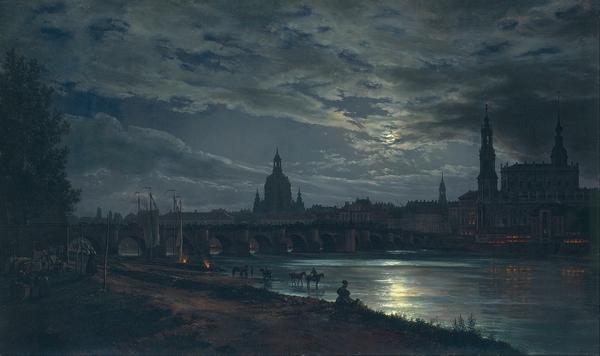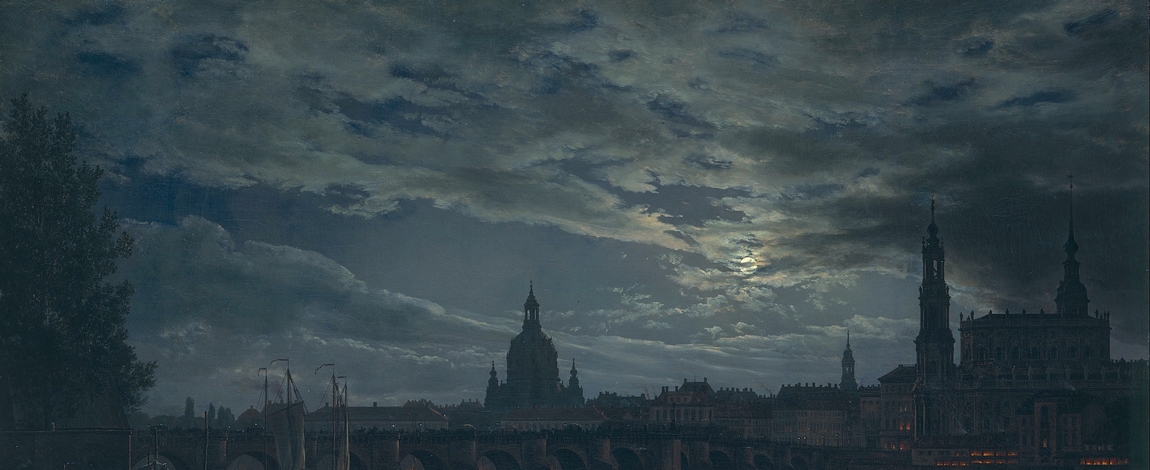
If we speak about Heine's Lieder, that is, about songs written after poems by Heine, the name of two composers comes immediately to mind: Schubert and Schumann. Schubert, who only left a small and magnificent sample of six Lieder after poems by Heine before his death, and Schumann, who twelve years later composed around forty songs, among them two cycles as important as Dichterliebe and Liederkreis, Op. 24.
And between Schubert and Schumann, no one? Because twelve years are many years to ignore a renowned poet as Heinrich Heine, even if the poet was chased by censorship of the time. As you can imagine, there is someone. At least two composers: Johann Vesque von Puttlingen and Franz Lachner. I jotted down Von Puttlingen (who wrote about 100 Lieder with Heine's poem) in my blog's notebook to talk about him some day; this week we're listening to Lachner, included in the series The Buch der Lieder and ten composers.
Does that name sound familiar to you, Franz Lachner? Maybe vaguely? To Schubert lovers and even to Wagner lovers? Lachner was part of Schubert's circle of friends, that circle where all members devoted themselves in one way or another to music, art, or literature; our man was one of the few who was a professional, successful musician. The son of an organist who gave him the first musical training, Franz arrived in Vienna in 1823 as organist of the city's Lutheran church; he soon entered the Royal Court Theater back then, the Kärntnertortheater and in 1825 he was appointed first Kapellmeister, i.e. in modern terms, musical director of the theatre. However, his career developed mainly in Munich. He went there in 1836, called by Maximilian II on the commission to grow the musical life in Bavaria; he certainly succeeded, and several authors claim that we owe him the musical life is this state as we know it today. He was the musical director of the opera for thirty years, until he resigned when Ludwig II, who succeeded Maximilian II, called Wagner to stay with him.
In addition to organizing, managing and conducting, Lachner was a quite prolific composer: four operas, eight symphonies, three concertos, many chamber piano and organ works, masses... and Lieder, more than two hundred. After Lachner's death in 1890, his work was forgotten; more or less, as the work by our last week composer, Joseph Marx.
Most of Lachner songs were written in Vienna a few years after Schubert's death. All in all, he wrote about thirty songs with Heine's poem, and I wanted to talk to you about a cycle that includes sixteen of them, Sängerfahrt [Singer's Journey]; I don't remember any other cycle with Heine's Lieder with so many songs. If we look over the poems, we see that two of them were previously musicalized by Schubert (Fischermädchen and Ihr Bild); apart from two later composed by Brahms and two more by Wolf, there are five poems that Schumann also used. You see, Lachner was a precursor!
His Lieder were highly praised at his time in Vienna, and I think they deserve better than what they have now; at least, this cycle, Sängerfahrt, hides very pleasant surprises. There are not many recordings; we can find selections recorded by Mark Padmore and Kristian Bezuidenhout, John Mark Ainsley and Malcolm Martineau or Christoph Prégardien and Andreas Staier. But, as far as I know, there is only one complete recording, that of Rufus Müller and Christoph Hammer. We're listening this week one song from this recording, the second in the cycle, An den Mond [To the moon]; the poem is part of Die Heimkehr ( you will find in this article the structure of the Buch der Lieder), the no. 86, just before another one also included in this series, a song by Brahms: Der Tod, das ist die kühle Nacht.
I hope you'd like this Lied from Franz Lachner and, who knows, maybe you'll listen to the whole Sängerfahrt cycle.
Nacht liegt auf den fremden Wegen,
Krankes Herz und müde Glieder; -
Ach, da fließt, wie stiller Segen,
Süßer Mond, dein Licht hernieder;
Süßer Mond, mit deinen Strahlen
Scheuchest du das nächt'ge Grauen;
Es zerrinnen meine Qualen,
Und die Augen übertauen.
Night lies on the unfamiliar roads;
a sick heart and tired limbs...
ah, like a quiet blessing, there flows down,
sweet moon, your light;
Sweet moon, with your rays
You drive away the night horror;
Away runs my pain,
And my eyes brim over with tears.
(translation by Emily Ezust)




 The Kin...
The Kin...









